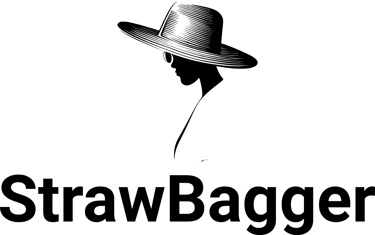Adopt a "strawbagger mindset!"

Sustainable Fabrics
As consumers grow more conscious of the environmental impact of their wardrobes, sustainable fabrics have taken center stage in eco-friendly fashion. These materials are crafted with care for the planet, using processes that minimize water waste, reduce chemical use, and support ethical labor practices.
From plant-based fibers like hemp, organic cotton, and linen to innovative textiles like Econyl and recycled polyester, sustainable fabrics offer a wide range of textures, performance qualities, and environmental benefits.
Each fabric tells a story of responsible sourcing, lower emissions, and thoughtful design. Whether it’s the breathable softness of bamboo lyocell, the resilience of hemp, or the circular potential of recycled fibers, these materials empower consumers to make mindful choices without sacrificing style or comfort.
Below, we have included a curated guide to some of the most notable sustainable fabrics being used in fashion today, including their key benefits and ideal uses.

Hemp
Hemp is one of the most sustainable natural fibers available. It requires minimal water, no pesticides, and grows quickly, making it an ideal crop for eco-conscious textiles. Hemp fabric is strong, breathable, and softens with wear, often compared to linen in texture.
In fashion, hemp is prized for its durability and its ability to regulate body temperature, keeping you cool in summer and warm in winter. It’s biodegradable and often blended with other fibers to enhance softness or elasticity without compromising its sustainable qualities.
Organic Cotton
Unlike conventional cotton, organic cotton is grown without synthetic pesticides or fertilizers and uses significantly less water. It supports healthier ecosystems and safer working conditions for farmers.
Organic cotton is soft, breathable, and hypoallergenic, making it a popular choice for everything from everyday t-shirts to high-end garments. It's biodegradable and easy to recycle or compost at the end of its life. Learn more...
Recycled Cotton
Recycled cotton is made by reprocessing cotton fabric scraps or post-consumer garments, diverting textile waste from landfills and reducing the need for virgin cotton production. This process saves water and reduces chemical use.
Though recycled cotton may be slightly less durable than virgin cotton due to shorter fibers, it’s an excellent choice for casual wear, insulation, and blended fabrics. It's a strong step toward circular fashion. Learn more...
Linen
Derived from the flax plant, linen is a naturally eco-friendly fabric that requires little water and thrives without pesticides. Its production has a low environmental impact, and the entire flax plant can be used, minimizing waste.
Linen is breathable, moisture-wicking, and highly durable—ideal for warm-weather garments or layering pieces. It biodegrades quickly and only gets softer with each wash, making it a long-term wardrobe staple. Learn more...
Bamboo Linen
Bamboo linen is made from the bamboo plant using mechanical rather than chemical processes, making it a more sustainable alternative to viscose-style bamboo fabrics. The result is a textured, breathable fabric similar to linen.
Bamboo grows rapidly without the need for irrigation or pesticides, and the mechanical production of bamboo linen helps preserve those environmental benefits. It’s durable, antimicrobial, and biodegradable. Learn more...
Cork
Harvested from the bark of cork oak trees (without cutting them down), cork is a renewable and biodegradable material used increasingly in accessories like shoes, bags, and wallets. The trees regenerate bark every 9–12 years.
Cork is water-resistant, lightweight, and naturally antimicrobial. It offers a leather-like texture without animal products, making it a sustainable and cruelty-free alternative in fashion design. Learn more...
Recycled Polyester (rPET)
Recycled polyester is made from post-consumer plastic bottles or discarded polyester garments, reducing landfill waste and reliance on fossil fuels. It uses less energy and water than virgin polyester.
While rPET still sheds microplastics during washing, it supports circular manufacturing when recycled properly. It is commonly used in activewear, outerwear, and accessories for its durability, wrinkle resistance, and moisture-wicking qualities. Learn more...
Econyl
Econyl is a regenerated nylon made from waste materials like fishing nets, fabric scraps, and industrial plastic. It offers the same performance as virgin nylon but with a much lower environmental impact.
Used in swimwear, lingerie, and athletic wear, Econyl helps reduce ocean plastic and supports closed-loop manufacturing. It is durable, stretchy, and can be recycled again and again without loss of quality. Learn more...
Deadstock Fabric
Deadstock refers to leftover or overproduced fabric from fashion houses or mills that would otherwise go to waste. Repurposing this material reduces landfill use and gives new life to existing resources.
It’s a sustainable way to create limited-edition or one-of-a-kind fashion pieces. However, availability is limited and inconsistent, which makes large-scale production difficult. Still, it’s a smart choice for small brands or upcyclers. Learn more...
Lyocell (TENCEL™ Lyocell)
Lyocell is a semi-synthetic fiber made from sustainably sourced wood pulp (usually eucalyptus or beech) using a closed-loop process that recycles water and solvents.
Lyocell is soft, breathable, and biodegradable. It drapes well and resists wrinkles, making it a favorite for eco-conscious fashion brands. TENCEL™ is the most recognized branded version, known for its high environmental standards. Learn more...
Bamboo Lyocell
Unlike bamboo viscose, bamboo lyocell is made using a closed-loop process similar to TENCEL™, which safely recycles chemicals and minimizes waste.
It offers a silky-soft feel and excellent breathability while retaining bamboo’s natural antibacterial properties. It’s an ideal sustainable choice for loungewear, bedding, and underwear. Learn more...
ECOVERO™
Produced by Lenzing, ECOVERO™ is a sustainable alternative to traditional viscose, made from responsibly sourced wood pulp and manufactured in a process that reduces emissions and water use by up to 50%.
The resulting fabric is lightweight, breathable, and biodegradable. It’s often used in dresses, blouses, and soft separates for a luxurious, eco-friendly feel. Learn more...
Modal (including TENCEL™ Modal)
Modal is a type of rayon made from beech tree pulp. When produced under responsible conditions (such as TENCEL™ Modal), it uses sustainably managed forests and closed-loop systems to reduce environmental harm.
Modal is soft, stretchy, and highly absorbent. It’s ideal for undergarments, activewear, and casual basics, offering comfort without compromising sustainability. Learn more...

